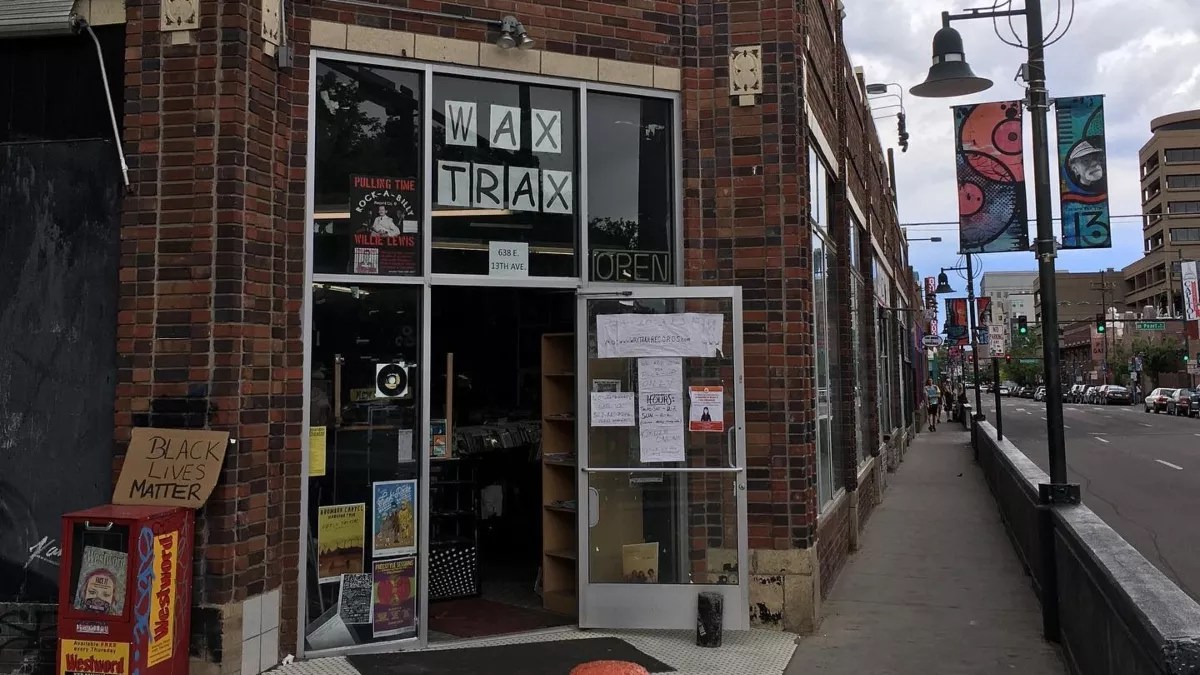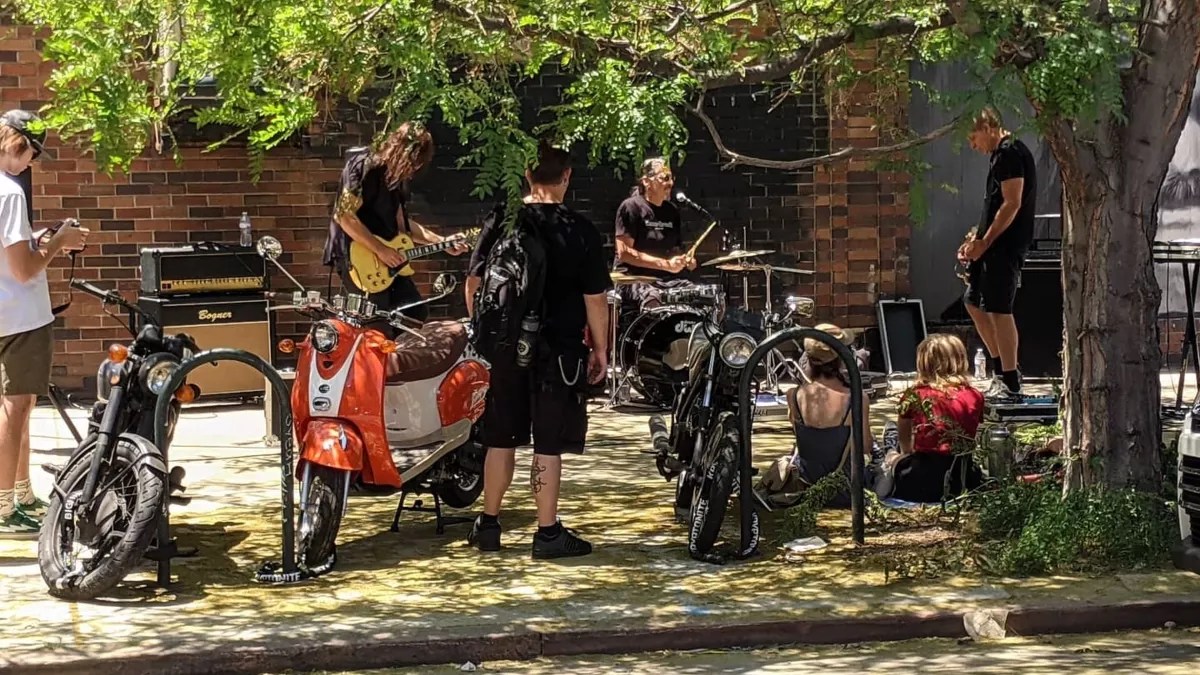
Courtesy of Wax Trax

Audio By Carbonatix
“Noise Annoys,” a 1978 Buzzcocks song, offers a prime example of the subjectivity of music. Punk-rock fans regard it as a glorious classic, while haters of the style have long found it to be supremely irritating.
A similar divergence of opinion is at the center of a dispute between Wax Trax Records and one of its Capitol Hill neighbors, who specifically cited “punk” in a noise complaint about outdoor live-music events put on by the store in recent years. And even though the matter was dismissed at a hearing last month after the neighbor failed to show up, the Denver Department of Public Health & Environment is appealing.
“If not appealed,” says DDPHE spokesperson Amber Campbell, “the department believes that this decision may have lasting effects on witness participation requirements for future noise hearings and set a potential precedent that would make the enforcement of the noise ordinance more challenging.”
The city is currently exploring revisions to that ordinance – and Pete Stidman, Wax Trax manager and son of the shop’s co-owner, Dave Stidman, is scheduled to meet with Denver representatives on March 13 to discuss possible changes; he’s pushing an amendment that would legalize shows like the one that put Wax Trax in the DDPHE’s crosshairs. But he remains frustrated about having to re-litigate a case he thought he’d already won.
He suspects that the unhappy neighbor’s antipathy for punk was perhaps more responsible for the grievance than the volume at which it was played. “We have all genres of music at our events: folk, rockabilly, R&B, metal,” Stidman notes. “But we did have a little string of punk shows when the complaint came in. So it appeared to us from the language that [the neighbor] just didn’t like punk music. Some people don’t like country, some people don’t like jazz – but should the city really be taking sides on which musical genres get to be played in public?”
Wax Trax was founded in 1975 by Jim Nash and Dannie Fleisher, and moved to its present location, at 638 East 13th Avenue, three years later, when Stidman’s father and partner Duane Davis took over the operation; meanwhile, the original owners headed to Chicago, where they launched the highly influential Wax Trax! Records label.
Pete Stidman only recently took a leading role at Wax Trax. He spent much of his professional life in the Boston area, acting as a city planner for communities such as Cambridge and Somerville, before relocating to Denver in early 2020. “I was transferred here, and I had the idea of helping my dad retire on the side along with my other job,” he says. “But then the pandemic happened. We got here on March 3, and on March 16, we had to shut down the shop.”
To help navigate the crisis, Stidman took a leave of absence from his regular gig; he eventually became manager at Wax Trax. Even after the store was allowed to reopen, most concert venues remained closed, and that gave him an idea. “Everybody was missing live music,” he recalls. “Live music was just nonexistent, and we have a little part of the sidewalk that we own; it’s our private property. So we thought we could put on some music there, to give folks some relief from the boredom. And for a lot of bands, it was their first time playing since the start of the pandemic.”
The events became weekly in 2021, running from May to October that year and the next, with acts such as American Culture and Quits taking part. “We designed the shows to be as low-impact as possible,” Stidman notes. “Two or three bands would play 45-minute sets on Sundays from one to three or four in the afternoon.”

Juliet Mission playing outside Wax Trax in June 2021.
Courtesy of Wax Trax
Over time, the shows became the centerpiece of an affiliated event, the 13th Ave Flea Market, mainly organized by Kilgore Books & Comics, which occupies a space in Wax Trax’s building; other businesses in the neighborhood joined in and were making “more money than they used to,” Stidman says. Most neighbors seemed fine with the extra activity, he adds: “Once we got the noise complaint, we asked for some feedback, and the folks who lived right next door said they could look out their window and look at the bands. They said they loved it and looked forward to it every week.”
But there was a notable exception. The “Allegations” section of the noise complaint, filed in October 2022, includes a quote from the anonymous neighbor griping about “punk band concerts playing on the sidewalk with full drum kits, amps and band performance. The concerts go on for hours and now every weekend that shakes the windows to our apt across the street. I’ve been patient and can handle loud music, but it’s escalating and moved to weekly instead of monthly. It triggers migraines with how loud it is since they’re right outside in a residential area. The cherry on top is that often these bands are playing to a crowd of less than 10 people and instead just cause hours of hell every weekend for their neighbors.”
Stidman says he asked the city’s noise inspector if he could meet with the neighbor to see if they could work out an accommodation, but was told the person “couldn’t be bothered.” Stidman didn’t push it, because his reading of Denver’s noise ordinance, combined with the inspector’s readings, convinced him that the statute essentially outlawed events like the ones Wax Trax had been staging.
“The city only allows 55 decibels during the day in the ordinance, and the ambient noise in Capitol Hill came in at 58.5 decibels – so the neighborhood is violating the ordinance every day just by being there,” Stidman points out. “If a truck went by, it was at about 69 decibels, and the loudest point in the show the city measured was 76 decibels, which gives you an idea of the scale. We’re not talking about a super-loud concert. It’s just a small PA system with enough amplification so you can hear the music over the drums. And if you can’t have amplification, you’re basically outlawing certain genres of music. You can’t have modern rock and roll or hip-hop or electronic music without amplification.”
Music festivals are given more leeway, he notes: “You can do 80 decibels for four days in a row if you have enough money. But if you’re a person with a backyard or a business like us, there’s no way to do that. You have to apply for a music-festival license even if you’re just doing a show on a Sunday, and it’s outside our capacity to do that.”
Others have run afoul of these restrictions in recent years. Musician Rico Jones was forced to suspend jazz concerts at his Highland neighborhood home during the pandemic, and Number Thirty Eight paid a $2,000 fine and suffered a six-day suspension of its cabaret license after settling with the city in October 2022 over noise complaints from RiNo neighbors.
Stidman was determined not to go down without a fight at the February 1 hearing, and prepared a detailed presentation challenging the ordinance. But before he could share all of his material, supplemented by positive testimonials from other neighbors, hearing officer Samuel Cowles rejected Denver’s argument. “He said the city hadn’t produced the complainant or any witness that would say this was psychologically or physiologically harmful,” Stidman recalls. “So the city didn’t meet the requirements of the ordinance.”
Days later, the DDPHE informed Stidman of its plans to appeal – and after being contacted by Westword, the department sent him an email citing concerns about the dismissal setting a precedent. Stidman’s response: “The state’s police power overall is limited by specific rights that are guaranteed by the Constitution, including the necessity of a legitimate public purpose and a reasonable exercise of power. And taking an anonymous person’s word against a business that’s been here for 45 years and a whole slew of people saying this has been a public good for them is not a reasonable exercise of their power.”
The date for the appeal has not yet been set; in the meantime, the city is pressing ahead with proposed changes to the noise ordinance.
“Our department decided to initiate the revision for several reasons,” Campbell notes. “It was last revised fifteen years ago, and in order to address the changing city landscape, as well as noise sources across the city, it was time to do so. Denver has grown and developed dramatically in those fifteen years. We are seeing more and more mixed-use areas, where residential properties are abutting commercial and industrial zones. We are looking to address these challenges by updating the ordinance. Additionally, there are more special events and festivals being held within Denver city limits than ever before. The revisions to the ordinance will also help us better, and more efficiently, address the city’s desire for these types of events.”
Stidman would like to see even more events, and at the March 13 meeting with DDPHE to discuss the ordinance, he will present a proposed Capitol Hill Community Performance Amendment that would allow a venue to hold two-hour-long, public, alcohol-free shows once a month; he’s currently circulating a petition to collect support.
“There are all kinds of people who will tell you that music calms the soul and brings people together,” he contends. “It brings all kinds of mental and physical health benefits to the community. And if the purpose of the ordinance is to eliminate harmful noise in the city, music ain’t it.”
Whether it’s punky or not.